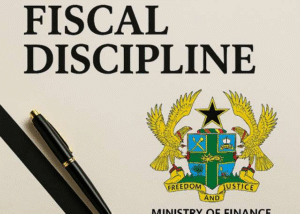The International Monetary Fund (IMF) has commended the Government of Ghana for demonstrating significantly improved fiscal discipline in 2025, marking a marked shift from the patterns of expenditure seen in the previous year.
According to the Fund’s comments, government spending controls this year have helped narrow the budget deficit, ease pressure on the cedi and contribute to price stability, a development that partly underpins the drop in inflation to single digits for the first time in four years.
Dr Adrian Alter, IMF Resident Representative to Ghana, said in an interview that while macro-economic challenges remain, the alignment of fiscal restraint with a tight monetary stance has produced noticeable results. “When you look at fiscal discipline this year, it is much, much better under the current government than the level of spending we saw last year,” he remarked.
Ghana entered 2025 with an array of economic headwinds: high inflation, a depreciating currency, and a large budget deficit carried over from previous years. By September, inflation had fallen to 9.4 %, down from about 24 % in 2024, with expectations of further moderation as the cedi showed signs of stability.

The IMF highlighted supply-side shocks and exchange-rate depreciation as major drivers of last year’s inflation surge. In contrast, this year Ghana is seeing a stronger currency, better commodity export receipts and more disciplined public spending. Dr Alter cited the government’s cautious approach, alongside the Bank of Ghana’s deliberate monetary tightening, reducing the policy rate from 28 % to 21.5 %, as central to the turnaround.
Official data show the government has improved its fiscal position. Mid-year figures revealed a primary surplus of around 1.1 % of GDP for the first eight months, and Ghana has revised its full-year fiscal deficit target downwards. The IMF staff-level agreement for the country’s programme under the Extended Credit Facility flagged this improvement and noted strong export and reserve trends.
Still, the Fund cautioned that sustaining discipline will be crucial for maintaining investor confidence and anchoring inflation expectations. Without continued strict budgeting and reform implementation, early gains could be reversed. “Overall, the authorities are placing the country on a stronger macroeconomic footing,” Dr Alter said.
For Ghana, the approval of the fifth review under the IMF programme earlier this year signalled international endorsement of the country’s reform pace. The IMF underscored that fiscal and monetary policies are now more coherently aligned.

On the revenue side, Ghana has intensified efforts to mobilise domestic income, streamline expenditures, and enhance public-investment management. These structural reforms are part of the broader roadmap to reduce fiscal vulnerabilities and bring the debt-to-GDP ratio onto a more sustainable path.
Improved export performance – particularly from gold and cocoa – alongside better foreign-exchange operations has allowed the cedi to appreciate and foreign-reserve levels to rise. These external-sector improvements complement the strengthened fiscal stance and reinforce macro-economic stability.
Critics, however, warn that the positive momentum must translate into visible socio-economic improvements. While inflation is easing, many households still face cost-of-living pressures and public-sector wage demands are rising. The government will need to deliver on growth, job creation and inclusive development to maintain public buy-in.
Sector analysts believe the IMF’s praise offers a window of opportunity: improved macro-economic indicators could unlock further foreign direct investment, better credit ratings and deeper engagement with multilateral lenders. The timing is critical as Ghana enters another budget cycle and prepares for the next phase of its reform agenda.
In sum, Ghana’s 2025 fiscal performance is receiving international recognition for its improved discipline and alignment of fiscal-monetary policy. The challenge ahead lies in embedding these gains into sustainable growth and ensuring that the benefits reach ordinary Ghanaians.
Ghana Surpasses IMF Reserve Target Ahead of Schedule, Boosting Economic Outlook

